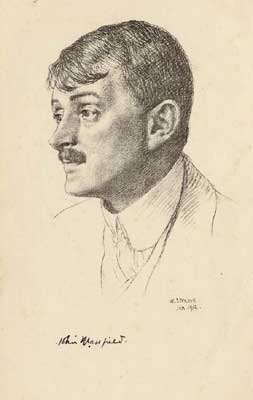„Все писатели стремятся понять дух своего народа.“
Речь «Святой Георгий и дракон», произнесенная в Херефорде.
Джон Мейсфилд — английский поэт, писатель, журналист. С 1930 поэт-лауреат. Известен также фантастическими романами для детей: «Люди полуночи» и «Ящик наслаждений» . Wikipedia

„Все писатели стремятся понять дух своего народа.“
Речь «Святой Георгий и дракон», произнесенная в Херефорде.
Salt-Water Ballads (1902), "The West Wind"
Ballads and Poems (1910), "Captain Stratton's Fancy"
King Cole and Other Poems (1926), " The Rider at the Gate http://www.cs.rice.edu/~ssiyer/minstrels/poems/1251.html"
Salt-Water Ballads (1902), "Trade Winds"
Ballads and Poems (1910), " C. L. M. http://theotherpages.org/poems/masef01.html"
“My blood did leap, my flesh did revel,
Saul Kane was tokened to the devil.”
The Everlasting Mercy (1919)
" Where does the uttered Music go? http://www.williamwalton.net/works/choral/where_does_the_uttered_music_go.html" (1946)
Ballads and Poems (1910), " C. L. M. http://theotherpages.org/poems/masef01.html"
The first line is often misquoted as "I must go down to the seas again." and this is the wording used in the song setting by John Ireland. I disagree with this last point. The poet himself was recorded reading this and he definitely says "seas". The first line should read, 'I must down ...' not, 'I must go down ...' The original version of 1902 reads 'I must down to the seas again'. In later versions, the author inserted the word 'go'.
Source: https://poemanalysis.com/sea-fever-john-masefield-poem-analysis/
Salt-Water Ballads (1902), "Sea-Fever"
Ballads and Poems (1910), "Spanish Waters"